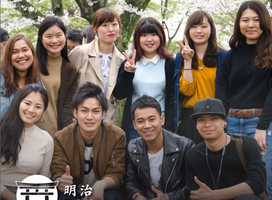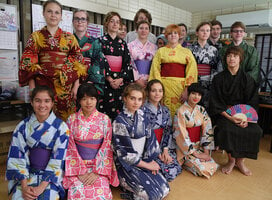Japanese Language Schools in Japan
Although only about 2% of the world’s population speaks Japanese, Japan’s commanding role on the global stage makes the ability to speak Japanese a valuable tool. What's more, Japan’s historic policy of isolation means that the country still maintains impressive linguistic and cultural individuality, and a distinct cultural flavor that permeates almost every aspect of day-to-day life in Japan. Japanese culture and language are inexorably intertwined, and even a few weeks in Japan will benefit any student.
Go Overseas has everything you'll need to get started. Tab through our expert guide to finding a Japanese Language School in Japan. Then read reviews and choose your favorite Language School from the list below. You'll be well on your way to fluency in Japanese!
There are a variety of programs for folks interested in learning Japanese abroad. When looking for the perfect one for you, bear in mind your personal language goals. If you’re hoping to kick your language-butt into shape, you might want to look for a long-term or an immersion program -- while a more intensive program will certainly be hard work, it will get you talking in no time!
If you are looking to gain simple conversational fluency, concentrate on more casual programs that combine cultural activities alongside academic classes, so you can mix work with play. Also, be aware that within the Japanese islands there are countless regional accents. Most courses focus on standard Japanese, or the “Tokyo” dialect, although what you’ll hear in the streets is anyone’s guess! Here’s some advice to help navigate Japanese language programs in Japan:
University courses
University courses are often the most structured option, as most have to adhere to strict curriculums. However, the clear organization of university courses makes it a breeze for college students to transfer credit appropriately, and for alternative learners to easily track their language level. Japanese universities also offer many classes in English that deal with Japanese history, literature and culture. Learners who are not currently enrolled in a university be warned: you may find it difficult to enroll in just a few university courses abroad.
Pros: high-quality instruction, course credit
Cons: less flexible scheduling, less individual attention
Group courses
Group courses are an excellent and budget-friendly option for both new and advanced learners. Small classes ensure individualized attention (which is useful for a difficult language such as Japanese) without the hefty price tag of private tutoring! Most language schools and programs combine several hours of teaching with free time or optional cultural activities so students can explore all the sights and activities that Japan has to offer. Consider the number of course hours offered each day and your language goals to determine if a program is right for you.
Pros: Long and short term programs, offered for all ages/levels, interaction with other learners.
Cons: Limited college credit, less individualized attention.
Private tutoring
Private tutoring offers the most flexibility to students who are looking for something a little different. They can be taken along with or independent of other classes; and scheduling is totally up to you! Learners who are studying Japanese for a specific purpose (such as Japanese for business or medicine) can tailor their private lessons to suit their communication needs. Teachers will assess each individual’s strengths and goals and design a unique curriculum and schedule that fits!
Pros: flexible content, scheduling, and speed.
Cons: can get expensive, limited transfer credit.
Cultural Immersion/Extracurricular Activities
Japan puts extensive resources into their unique culture (as shown by the government funding and honors for artisans and craftsmen considered “cultural treasures”). Programs often offer classes in Japanese art, dance and much more. Students should definitely take advantage of any and all opportunities provided. Many programs also offer a homestay component, where you'd live with a Japanese host family, which is a fantastic way to get extra exposure to Japanese culture and society.
Tokyo
Tokyo is home to hundreds of universities and colleges, including the University of Tokyo - the #1 university in Japan. As Japan's capital, Tokyo certainly lives up to Japan's reputation for modernity with its bright lights, bustling streets and non-stop turnover of new gadgets in Akihabara (the 'electric town'). Folks seeking a cosmopolitan experience and who are particularly interested in the fields of business and technology will have plenty to explore in Tokyo. Take a stroll in the peaceful Shinjuku Gyoen National Garden or tour The Tsukiji Fish Market. And as the capital of the country, Tokyo has a TON of Japanese language programs, from university courses to weekly group lessons.
Kyoto
Now known as Japan's cultural capital, Kyoto was, in fact, Japan's political capital for more than 1000 years, up until 1868. Home to 17 UNESCO World Heritage sites, Kyoto is perfect for students seeking to explore Japan's rich history, language and culture. The “Kyoto” dialect was the de facto standard while the city was the seat of government, and is characterized as being both harsher and more melodic to speakers of “standard” Japanese. Kyoto also has the benefit of being slightly cheaper than the cities of Tokyo or Osaka (which rank as two of the most expensive cities in the world).
Learn more about Learning Japanese in Kyoto.
Osaka
Osaka is one of the command centers for the Japanese economy. As an international gateway for trade, politics and learning, Osaka will provide those interested in business and politics with an exceptional experience. It’s also considered the gastronomic capital of Japan, so get ready for some SERIOUS eating. The Osaka specialty is takoyaki; served in boat-shaped bowls, it consists of balls of battered octopus covered in a sticky sauce and sprinkled with dried bonito tuna. It’s served everywhere from street stalls to gourmet restaurants; you’ll want to try every variation. As an economic powerhouse and “Japan’s Kitchen,” Osaka remains Japan's best place for work hard and play hard. And if all of that hasn’t convinced you, in 2014, Harry Potter World opened in Osaka...
Japan offers many unique opportunities and challenges to language learners. Once you’ve chosen how and where to learn Japanese, you’ll still face a ton of decisions to make your trip successful. Some programs require language prerequisites or other qualifications in order to enroll. Still other programs are a bit pricey, so students may need to investigate the scholarships available.
For Japanese learners who are just starting their studies, or for students who are at a near-native level, you may need to find programs that cater to your level of comprehension. Finally, all students should investigate “After School Activities;” the myriad of cultural activities that will help you really take full advantage of your time abroad!
Why Learn Japanese in Japan?
Learning Japanese can be scary - there are new characters to memorize as well as different grammatical structures, but there are some distinct advantages to learning Japanese in Japan. For example, Japanese phonology is relatively easy; there are only five basic vowel sounds and only 15 consonants (give or take, since consonants don’t truly exist in Japanese), and hearing native speakers will help beginner students quickly learn the accent.
For more established students, going abroad can mean a huge jump in comprehension and fluency, as you make the move from the classroom to the real world. Even students who have reached a language learning “plateau” and who may be feeling burned-out will be reinvigorated by the challenges of being abroad. Learning Japanese in Japan will give beginners a leg up on language learning, keep advanced students motivated, and provide everyone with an overall deeper understanding of the language.
While you can always learn Japanese at your local university, (or even on the internet, while you’re still wearing your pajamas) why not go straight the source? Take the opportunity to gain valuable cultural insights as well as endless opportunities to put your language skills to work!
Qualifications
Whether you’re just starting out or reading The Tale of Genji in the original language, Japanese learners of almost any age and language level will find a program that suits their needs. Many programs require a straightforward proficiency exam to gauge your language level. (And if you’re a newbie and a little nervous about the language barrier while studying abroad in Japan, focus your program search to larger cities where many people will speak a little English).
Costs
Japan's cost of living is among one of the highest in world, with Tokyo and Osaka topping the list. But don't worry! This is certainly not the end of your Japanese dreams. Many programs are quite affordable (especially group courses that offer discounts for larger groups. So team up with a friend and start your language adventure!).
Some programs even offer scholarships or other financial aid packages to students in need. Although, apartments in Japan are infamously small and expensive, often, language schools in Japan will also provide reasonably priced housing, or can help guide you in your search.
Keep in mind that big cities, while easier to navigate for language learners in a new location, tend to be much more expensive. If you need to pinch pennies, consider learning Japanese in a smaller town, or forgoing extra language classes for a language exchange with a local university student. For more information, review our expert tips on studying in Japan on the cheap. Do your own cost/benefit analysis and decided what’s right for you!
Scholarships
Learning a language abroad doesn’t need to drain your bank account! Check out the following scholarships for learning Japanese in Japan:
- Japan Student Services Organization lists scholarships for students enrolled in Japanese universities for both short term (less than 3 months) and long term programs.
- The Peace Boat Global Friendship Award is available to individuals who demonstrate an interest in international exchange, peace, human rights, and equal and sustainable development.
- More Study Abroad Grants and Scholarships














